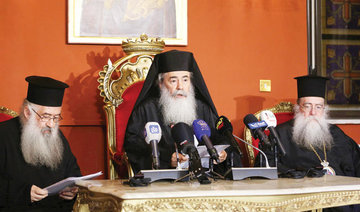AMMAN: Israel’s top court has ruled that a Jewish settler group legally purchased property in East Jerusalem from the Greek Orthodox Church. The decision ends a dispute over the buildings in the Old City that has lasted for almost two decades.
The Ateret Cohanim organization, which seeks to “Judaize” Israeli-annexed East Jerusalem, bought three buildings from the church in a controversial secret deal struck in 2004. The sale sparked fury among Palestinians and led to the dismissal of Patriarch Irineos I.
The church brought charges against Ateret Cohanim, claiming the buildings were acquired illegally.
In a decision released late on Wednesday, Israel’s Supreme Court dismissed the charges, stating that the “harsh allegations” of misconduct on the part of those involved in the sale were “not proven to be true” in earlier proceedings.
The church blasted that ruling as “unfair” and lacking “any logical legal basis” and went on to condemn Ateret Cohanim as a “radical organization” that had used “crooked and illegal methods to acquire Christian real estate” at a hugely significant site in Jerusalem.
The Higher Presidential Council of Churches in Palestine described the decision as Israeli legitimization of the “theft” of church property.
The court’s decision means that a proposed takeover by Israeli settlers of the Imperial Hotel has now potentially been made easier.
Maher Hanna, the Palestinian advocate for the family that runs the hotel, told Arab News that the decision means his client is now the “last line of defense” to protect the Palestinian presence in the area.
“My client, Mohammad Abu Waleed Dajani, has a long-term protected tenancy contract with the patriarchate and the applicable law prevents the expulsion of the tenants,” Hanna said, adding that he feels confident that his tenant will be able to remain in the hotel “if the Israeli government respects existing laws.”
Ramzi Khoury, head of the Palestinian Presidential Church Commission, called the court ruling a “racist and extremist decision” against Palestinians in Jerusalem. Khoury believes the aim of the court’s decision is to make the deportation of Palestinian Jerusalemites from their city easier.
“The court is not acting in a legal, or even ethical, way but rather as an enforcer of the decision of the Israeli government and (it) buckles under pressure from groups such as Ateret Cohanim,” he said. “The Israeli High Court is politicized in favor of a racist policy aimed at stealing Muslim and Christian holy places.”
Reverend Munther Isaac, pastor of the Beit Sahour Lutheran church, told Arab News that the Israeli government “is defending these extremists and has created a discriminatory law and regulation system that protects and supports these radical Jewish groups.”
Botrus Mansour, a Nazareth-based lawyer, told Arab News that all branches of the right-wing Israeli government, including the supreme court, are attempting to control key locations in Arab Jerusalem.
Mansour said that the international community is currently “distracted” by other issues and that the Israeli government is taking advantage of that to step up its anti-Palestinian activities. The only positive to come out of Israel’s recent aggression, including its attacks on Al-Aqsa and the killing of Al-Jazeera reporter Shereen Abu Akleh, he said, is that it has demonstrated to the world that Palestinians are fighting for their rights and has sparked a rise in solidarity with Palestinians around the world.
The church has pledged to use “all the influence and means” at its disposal to prevent the forced eviction of the hotel’s tenants.
The Patriarchate said it would “continue to support the Palestinian tenants in their steadfastness in these Christian properties,” adding that it is “unwavering” in its battle to curb “the racist policy and agenda of the extremist right-wing in Israel, aimed at eroding the multiple identity of the city of Jerusalem and imposing a new reality within it.”
Palestinians have long maintained that the proposed takeover of the strategically located hotel, along with the forced “evictions” of Palestinian families from the Jerusalem neighborhoods of Sheikh Jarrah and Silwan, is politically motivated and comes as part of Israel’s efforts to ethnically cleanse Jerusalemite Palestinians.
Since the occupation of Jerusalem by Israel in June 1967, organizations including Elad and Ateret Cohanim, backed by the Israeli state, judiciary and security services, have worked to gain control of Palestinian property in Jerusalem as part of their efforts to ensure a Jewish majority in the city. It is alleged that this scheme includes the construction of new colonial tourist sites, such as the City of David.
In March, the Greek Orthodox Patriarch of Jerusalem, Theophilus III, decried the settlers’ proposed takeover of the hotel as “a threat to Christian existence” and warned that the settler group was “hijacking” Jerusalem using violent coercion.
“This issue is not about the individual properties, but about the whole character of Jerusalem, including the Christian Quarter,” he said.


























